#Women during WWII
Explore tagged Tumblr posts
Text
The Underground Library by Jennifer Ryan
Dear Fellow Reader, Welcome to March! A month of madness? That seems to be what it is famous for but this year it has so much more – Spring Forward, St. Patrick’s Day, Easter – a whole cornucopia of spring! Get out the patent leather shoes! Meanwhile, I am sitting here warming my hands on a cup of tea! It is sometimes hard to overcome the damp, cold here in the Midwest. I am happy to tell…

View On WordPress
0 notes
Text

Obsessed with the fact that Spencer has the hand dexterity to knit this scarf, but can’t eat with chopsticks
#ignore the picture quality didn’t feel like digging more#but like what a loser <3#“it’s like trying to eat with two number 2 pencils’#or whatever he says#but casually knits up a scarf with stripes#do we think he’s a english or continental style knitter gang#I’m a continental knitter and I think he’d be an english style#just strikes me as the type to learn it the more ‘classic’ way than the speedier way#also adding to these tags bc this post came back up in my notes#I read somewhere that during wwII that the women could tell what side of the war you were on by how you knitted#and i just feel like if you were talking about knitting styles with him he would go on a whole spiel about it#my dearly beloved nerd#anyways thanks for attending my talk#spencer reid#matthew gray gubler#mgg#criminal minds
32 notes
·
View notes
Text
We were elitist because students from aviation and pedagogical institutions and universities joined the army, and that is why the atmosphere in our detachments was intellectually high. We had serious discussions, we took a record player with us and listened to classical music, and then we swore not to be in love with anybody until the end of the war. We thought that our main task was to fight and not to have dates. In 1943 there was a kind of breakthrough in the war at Kursk. At last our people realized and could see the victory, and that's why we permitted ourselves to be loved! Our detachment often had the same airfield as the men. We had dates and were in love with the boys. But I want to tell you that I speak rather often before young people, and I tell them that only during the war did I feel an atmosphere of man's nobility, a readiness to help. After the war, I never felt that in men's attitudes toward myself or the ladies. […] After the war I was fed up with aviation, and I decided to choose the most humane profession - teaching. I graduated from a teachers' training institute and worked as a teacher for ten years in secondary schools. Then I defended my dissertation, took the doctor's degree, and finally moved up to the position of director of the Institute of Theory and History of Education. And really I am happy. It was a noble war for our people; it was a great patriotic, enthusiastic feeling for all young people. For example, my younger brother was seventeen years old, and he added one year to his age to be accepted into the army. He was only at the front one year when he was killed near Kiev. His friend wrote to me how he had been killed, and I went there because it was twenty kilometers from where our regiment was stationed. I rushed there and opened his grave, and with their help I put him into a coffin, and then we reburied him. I could never do that now, when I'm sixty-eight years old, but then I was so young and brave, and he was so young, eighteen years old, and he had never even kissed a girl. Eighteen, and he was a commander of some detachment. We lost so many, and the best people, the best men. Some specialists think that we spoiled our genetic fund because we lost the best. The first to fight and the first to be killed. The last of my war experience is that I have more than one hundred sisters. We regularly meet twice a year in front of the Bolshoi Theater on the second of May and the eighth of November. Outsiders look, and they can't understand old ladies that sing and make noise. Of course this war was a just war, and that is why we are proud of our participation.
Lieutenant Zoya Pozhidayeva, "A Dance with Death: Soviet Airwomen in World War II" by Anne Noggle
(Though she never mentions it in her interview, Lt. Pozhidayeva met her own husband during the war in a very funny episode - Captain Klavdiya Terekhova-Kasatkina's interview tells the story.)
#wwii#wwii history#women's history#russian history#nachthexen#night witches#anne noggle#one of my favorite things about this book is piecing together extra parts of people's stories that they don't share in their own interviews#via what their sisters in arms have to say about them#there's two women who died during the war where it's extremely tragic because so many people share memories of them#but also beautiful because their stories are told anyway (marina raskova and lilya litvyak)#it would be more of an effort but i may do a couple of posts putting together some of the stories of those 2 from the survivors' pov#the other thing i really wanted to do was assemble all their takes on stalin's russia (NOT complimentary) but im worried of randos#finding the post and trying to get into it with me#there's one woman who has this throwaway sentence about her grandparents in her interview that is absolutely chilling#i haven't shared a quote bc there's no way to communicate just how chilling it is without the surrounding context of her entire interview
7 notes
·
View notes
Text
I just met an older black woman named cookie who told me she was traveling (which she "never does!") from (or after?) the family matriarch's funeral and before I could even finish my condolences she lit up and said "she lived to be 104!" And I was like "WOW she really lived life. Good for her!" Also like wow, imagine what she saw.
Cookie was so proud of family matriarch. Me too, honestly. (Another table opened up for her and her husband so they moved one over.)
When she got up, she said to me she's off to the wild unknown (traveling! A thing she doesn't much do!) and to wish her luck so I did.
Idk whose grandma and grandpa I just met but I love them. if you happen to have a grandma cookie please let her know she is a delight.
#family matriarch wouldve been born in like what 1919??#anyways i love cookie and wish her and her husband all the best in the world#all my oral history internship training just came back like ohhh cookie would be a Great Source#cookie family matriarch was born just around womens suffrage she mightve been a 1st gen black woman voter#she was probably born during the Spanish flu period!!#she was born just after the great war ended AND lived through wwii!!#i assume this means matriarch was a great or great great grandma
9 notes
·
View notes
Text
A Crash Course to Kendrick's Super Bowl Performance, from a Black Woman
Note: this does NOT go in depth into all of the song's lyrics. I don't have time to recount two decades of his discography. This is just a summary of the performance itself.
Let's start with the first visual we get:
UNCLE SAM - most notably recognized from WWII American wartime propaganda, Uncle Sam is the personification of American patriotism and freedom. The term "uncle" is also evocative of Uncle Tom from Uncle Tom's Cabin, an abolitionist book that aided in inciting the Civil War. Uncle is also a very common term (both endearment and derogatory) towards Black men (eg. "unc"). Samuel L Jackson was fantastic. (Edit: and please look up his history of civil rights activism, he was on the FBI watchlist and even a pallbearer at MLKJr’s funeral.)
Uncle Sam also resembles a circus ringleader, notable for my next point:
THE GREAT AMERICAN GAME - no, not Super Bowl. The GAG is us the people being pitted against each other: through late-stage capitalism, through the culture war, through class warfare, through being built of the backs of slaves. We are all players in the GAG because none of us on this site were the oligarchs seated at the inauguration.
This is also seen as Kendrick's stage was a Play Station controller. Not only did it remind of circus rings visually, but it was a game battle stage. The Great American Game is a battle royale of the commoners for the amusement of the rich whites.
Remember the foods / Them color was tin and brown / But now they 100 and blue - For this I'll just say, look what the last election said about lowering the price of eggs... and look at the prices now.
The revolution about to be televised / You picked the right time / But the wrong guy - Election 2024 once more. *Edit to add, the first part of this lyric is in reference to the Black Liberation Song "The Revolution Will Not Be Televised" by Gil Scott-Heron. Thanks to everyone who mentioned that.
THE FLAG DANCERS - yes, the dancers formed the US flag... off of the backs of Black people. Not a single white person in sight, and that's true of the cotton pickers in the fields. Plantations are part of how the US came to economic prominence after being a "backwater" colony. Remember tobacco? Cotton? Our bloodlines do. *Edit to add: they also all piled out of a clown car. The US flag in a clown car? Brilliant.
The red and blue dancers are also notable for representing the Crips and Bloods, two infamous street gangs. The dance in Not Like Us is the Crip Walk. I recommend researching more on your own time about them, but just know they are a large part of the stereotype of Black people being "ghetto."
TOO LOUD, TOO RECKLESS, TOO GHETTO. Do you really know how to play the game? - This is exactly what Black people, especially Black men, get told all the time. It's why we change our names on resumes if they sound "too Black." It's why we codeswitch in non-Black company. This is especially rich considering how non-Black people love our culture and love to make money off of us, as the latter part of the quote points to. And it's even more profound during the Super Bowl-- the NFL is majority Black players.
STREET LIGHT A CAPELLA -- "thug" stereotype dancers to counteract the a capella connotations, with Uncle Sam then saying that Kendrick figured out "bringing other street guys around being a culture cheat code." Yes, this is a direct hit at Drake (listen to "Not Like Us") but also politically. Look up "model minority". Notably I would point to Candace Owens, or the Miami Venezuelan political group that's been in the news recently, especially as this directly led to Kendrick being surrounded by...
DANCERS IN WHITE -- it's white America. That's... that's the allegory.
NOT LIKE US TEASER -- Kendrick says "Not Like Us" is "their favorite song." -> he means white people specifically here. It comes after he's surrounded by all white dancers, the women around him who are his call and response are also in white (my opinion, they represent the industry). He's saying "Not Like Us" is the favorite of yts because it is about BLACK MEN FIGHTING. This again is reflected in the video game stage and ringleader Uncle Sam.
SZA -- instead of giving what they want, we see SZA. She's one of Drake's exes and Kendrick has always supported her.
ALL THE STARS -- This was in the first Black Panther movie, which I recommend you watch. Rest in Power Chadwick. Notably, this movie was incredibly mainstream as a major Marvel movie, and then we have Uncle Sam say...
"THAT'S WHAT AMERICA WANTS: NICE AND CALM. DON'T MESS THIS UP" -- translation: Marvel (the industry, America, etc.) wanted a safe, semi-pop song because white American likes safe pop songs, not Kendrick's usual heavy rap style about his life as a Black man! Don't mess up what you've got going mainstream for having this "Black rap feud" with Drake, who is an R&B model minority to white people because he's safe.
So what does Kendrick say?
IT'S A CULTURAL DIVIDE / IMMA GET IT ON THE FLOOR -- He was warned not to be political or apologetically Black for this Super Bowl performance, but he is using this big stage opportunity to speak out.
40 ACRES AND A MULE / THIS IS BIGGER THAN THE MUSIC -- 40 acres and a mule are what the freed slaves were promised. Instead, this land went to white sharecroppers. Research Jim Crow laws.
THEY TRIED TO RIG THE GAME / BUT YOU CAN'T FAKE INFLUENCE -- rig the election, rig the industry like with model minority Drake, rig the Great American Game with culture war to distract from active class warfare.
NOT LIKE US -- the only thing I'll mention because it made me holler is Serena Williams crip walking on Drake's metaphorical grave. She's another one of his exes (read: Drake harassed the hell out of her). *Edit: she was also fined at the 2012 Olympics for crip walking in celebration at Wimbledon.
TURN THE TV OFF -- exactly like he said! The TV is a distraction, the Super Bowl is a distraction, the mainstream news is often a distraction. Turn it off and get with your people!
GAME OVER — could not see this on my stream but at the end of the performance, the lights in the stadium spelled this out. The world is watching, America…
In conclusion, Kendrick Lamar is a visionary and thank you for coming to my TED Talk.
#kendrick lamar#super bowl#immigration#tea time with hawk#samuel l jackson#mcu#sza#kdot#not like us#black history month
47K notes
·
View notes
Text
i think there should be more movies about living through the great depression i think they would be really interesting and resonant.
#we have grapes of wrath sure but what else??#historical fiction is so focused on wars and biopics and i get it i do there are Stories and Narratives there#war movies esp wwii movies are about Heroism and Patriotism and Sacrifice and there's Action and Good Guys and Bad Guys#biopics also have kind of an in-built narrative and if there's one thing popular history loves to do it's narrativize history#but there are narratives to be found in the lives of real people living through big events.#a romance set in the great depression would be a human story about finding love and happiness in the midst of turmoil and fear#a medical drama set during the spanish influenza could be a man vs nature story about helping people in the face of impossible odds#along the same lines why don't we have movies about nurses during the world wars i want movies about nurses during the world wars so badly#anything about women in war would be nice we never get to be in war movies#in one of my uni classes we read ab excerpt of a memoir this guy wrote about his parents who were both wwi veterans#and the trouble they had reacclimating to civilian life like obviously his father (a soldier) was shell-shocked#but more interesting TO ME was his mother who had been a nurse and had experienced independence and respect for the very first time#and she was also traumatized by yk The Horrors but she also seemed to yearn for it#i think she eventually got a job at the local veterans hospital because she just couldn't bring herself to stay home#and wouldn't that make a great family drama????? i'd watch the hell out of that
1 note
·
View note
Text
Nothing like reading a full novel in a day and crying your eyes out throughout the entire second half of it
1 note
·
View note
Text
sculptures* round 1 poll 1
*and installations and some other stuff i didn't know where to put
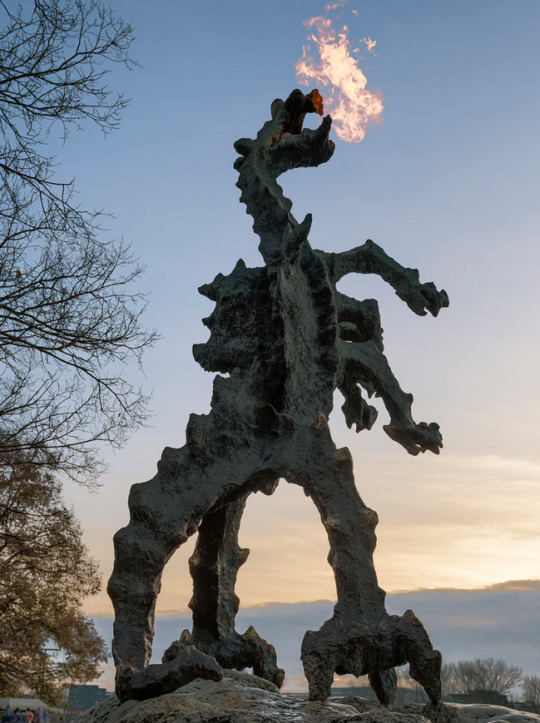
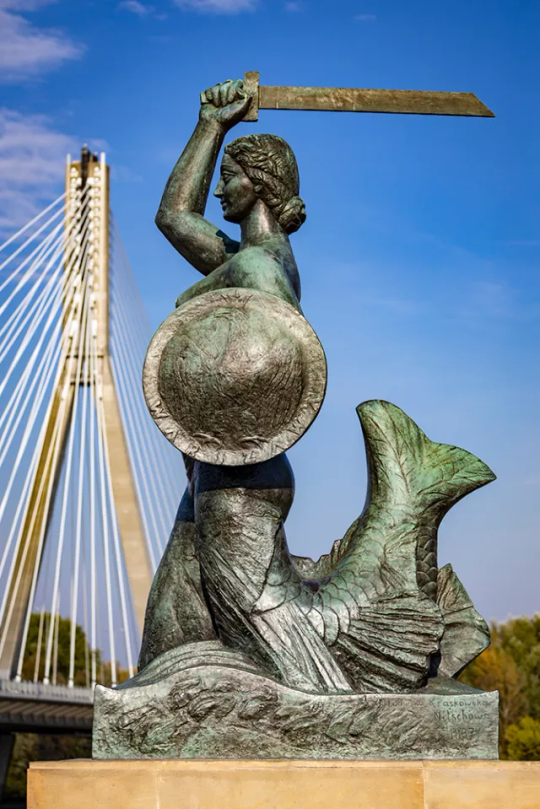
Smok Wawelski (The Wawel Dragon) by Bolesław Chromy, 1969:
propaganda: This is a famous and beloved statue outside of Wawel Castle (pronounced Vavel) in Kraków. The story of Smok Wawelski goes that he'd been eating all the animals (and people?) in Kraków so the king ordered his sons to kill him, but obviously the dragon is very dangerous. The princes tricked him by filling animals with tar and leaving them out. He ate them and when he tried to breathe fire, his insides burned up. There is a second version that says a cobbler tricked him into eating a tar-filled sheep and the tar made him so thirsty he drank the Wisła (the Vistula, the river that runs through Kraków) until he burst.
Fun fact, those are not extra arms but rather extra heads. Also, you can text the dragon to ask him to breathe fire, and then he does. He gets thousands of texts a day.
about the artist: When I was a kid, I was sure this statue was the actual Smok Wawelski that had somehow carbonized over a thousand years, but alas no, a guy made it in 1969 out of bronze. Bronisław Chromy was an artist, a professor, and Dragon Mother. He passed away in 2017.
Pomnik Syreny (Monument of the Warsaw Mermaid) by Ludwika Nitschowa, 1939:
propaganda: The Warsaw Mermaid is the symbol of Warsaw, and her image is all over the city in various forms. She's a warrior and is depicted with a sword and shield. She lives in the Wisła River (the Vistula), which runs thru Warsaw. There are different variants of her legend, but they all have something to do with her involvement in the foundation of Warsaw and her eternal role in protecting the city.
There are several statues of Syrenka around Warsaw, but the one I picked was created by Ludwika Nitschowa in 1936. It is made of gunmetal, and it stands on the bank of the Wisła. The model for this statue was a Polish poetess named Krystyna Krahelska. Krahelska joined the Home Army during WWII and participated in the Warsaw Uprising. She was shot and killed while rescuing a wounded colleague. I think it's really special the way the myth of Syrenka played out like this -- she really did protect the city, like in the legend. Incidentally, this statue was one of the few pieces of art in Warsaw not destroyed by the war.
tldr: badass warrior mermaid, made by a badass woman, modeled on a badass woman. women!
about the artist: Ludwika Nitschowa is the creator several famous statues in Poland, including of Maria Skłodowska-Curie, Copernicus, and several of Fryderyk Chopin.
both statues were submitted by @slaviclore 🐉🧜♀️
#warsaw#warszawa#kraków#cracow#poland#ludwika nitschowa#bolesław chromy#ok nie zawiedźcie mnie... chcę tu zobaczyć porządną ogólnopolską rozróbę#i mean i remember how much yall loved pruszkowski's dragon painting so i fear you might be biased#but. go warsaw!!!#polls#sculptures#br3r1
807 notes
·
View notes
Text
Revolutionary Girl Utena: Gender in Context
beneath the cut, I discuss the RGU's portrayal of gender in the context of 1990s Japan.
in Ikuhara's interview with Mari Kotani, he stated that in traditional Japanese society, "prince" meant "patriarch." the same is true in Western societies--there was a time when a prince would be an heir to a royal line. by 1997, this meaning had died out of large parts of the world. even the association between princes and traditional masculinity was fading. Saionji, the weakest, most pathetic man in the show, is a parody of historical Japanese masculinity, with his kendo and his blatantly regressive beliefs about women.
in RGU, prince may still mean patriarch, but in a far more subtle fashion. Ikuhara and Kotani discussed the changing expectations for men in the latter half of the 20th century--it became gauche to fight over a woman with one's brawn, so instead, power struggles were played out in the arena of looks and sex appeal. one can see this reflected in the character Akio, whose power as a prince arises from his ability to turn "easy sensual pleasure based on dependency" "into a selling point with which to control people."
Akio has his moments of showboating masculinity, but when preying on Utena, he operates by making himself seem non-threatening and soft.
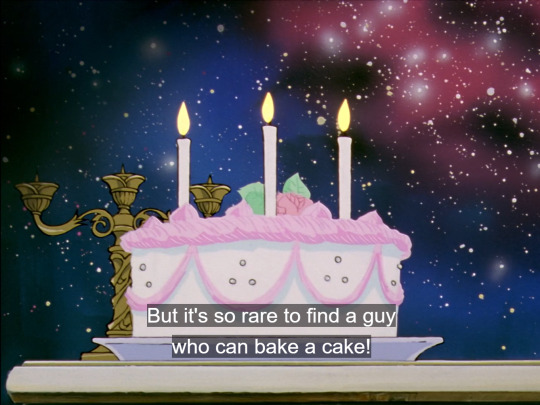
not only that, but he purports to want to allow students to express their individuality and thus approves of Utena's masculine form of dress. this is a front--by the end of the show, he's telling Utena that girls shouldn't wield swords. thus, through Akio's character, the show argues that traditionalist patriarchy in Japan isn't gone, but instead has only been papered over with false progressivism.
with all that said, there seems to be more to the character. he's taken the family name of his fiance, Kanae, and whatever material power he has in the school is dependent upon her family. in Japanese society, this is considered a humiliating position to be in, something that only a shameless man would do. the show never gives the audience any insight into how Akio feels about this--is he unbothered entirely, or are his actions against the Ohtori family an expression of his repressed anger? does he harm the children under his care to compensate for his humiliation?
this aspect of Akio's character may seem irrelevant in light of the larger, immaterial social forces at work in the show. however, I would argue that it was included for a reason. Akio, despite his status as ultimate patriarch of Ohtori, is in fact a highly emasculated character, to the point where lead writer Enokido even said that he is driven by an infantile mother complex.
to explain why Akio was portrayed this way, we have to discuss Japanese history. the nation suffered a major defeat in WWII and was forced to accept whatever terms the United States laid out for it. for an examination of how the Japanese have never truly processed those events and have plunged into modernity with reckless abandon, I recommend Satoshi Kon's Paranoia Agent. to sum it up briefly, in a very short period, the nation regained its economic footing, and by the 1980s had the largest gross national product in the world. this economic boom may have allowed Japan to maintain a sense of sovereignty, dignity, and power, but it was inherently fragile.
the infamous "bubble economy" lasted from 1986 to 1991. during this time, anything seemed possible; financial struggles appeared to be a thing of the past, and capitalist excess reached new heights. the ghosts of this period can be felt across Japanese media; for instance, think of the final shot of Grave of the Fireflies (1998), where the two dead children look down on Kobe, glowing an eerie green to imply its impermanence. the abandoned theme park from Spirited Away (2001) is explicitly referred to as a leftover from the previous century, when many attractions were built and then tossed aside in a few short years.
the bubble popped in 1992, leaving an entire generation feeling cheated. the bright futures they'd been promised, which had actually materialized for their parents and older siblings, had been lost to them overnight. economic crises are often accompanied by gender panics. to quote from Masculinities in Japan, "The recession brought with itself worsening employment conditions, undermining the system of lifelong employment and men’s status of breadwinners in general. The unemployment rate was rising, and although it never reached crisis levels, men could no longer feel safe in their salaryman status. Their situation was further complicated by the rising number of (married) women entering the workforce."
with this in mind, Akio's character can be taken as a representation of masculinity in crisis in 90s Japan. he's forced to rely on women for his position in life and has failed to save his only relative, Anthy. he tries to escape his misery through hedonism, perhaps an allegorical representation of how men tried to maintain their old standard of living after the economic bubble burst.
but of course, Akio is not the main character of RGU--the story is about girls. mangaka Yamada Reiji discussed the series in the context of the 90s, stating the following:
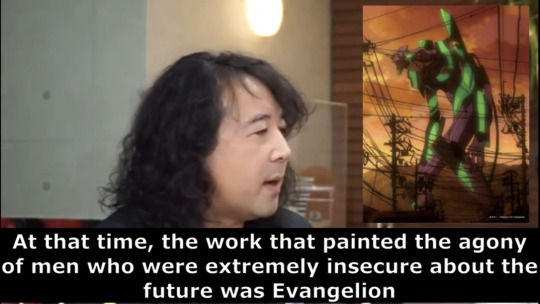
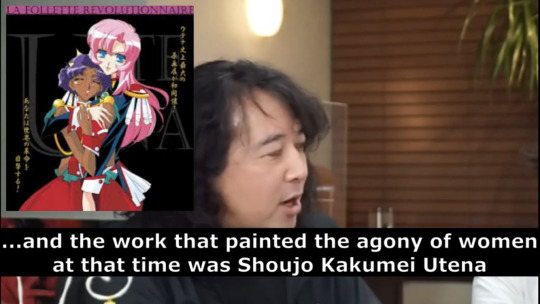
while I opened this essay by discussing the prince, the same points could be made about the princess. despite the increasing irrelevance of royalty, princess is still an important concept. how does it relate to the socioeconomic landscape of the 90s?
in Yamada's view, RGU is full of relics of the 80s; for instance, the figure of the ojou-sama, an entitled young woman who never lifts a finger for herself. during the economic bubble, it was increasingly common for women to be entirely taken care of by the men in their lives. Yamada names Nanami as a clear ojou-sama type character: she weaponizes her femininity, demanding to be rescued, doted on, and served.
however, by 1997, the ojou-sama could no longer expect to get what she wanted. from the 80s to the 90s, the percentage of women in the workforce increased around 15%; it was no longer viable for most women to be "kept" by their families. as the men experienced the humiliation of not being able to provide for their wives and children, women were undergoing a disillusionment of their own.
Yamada blames Disney for creating the ideological structure which led women astray. obviously, the company is known for its films about princes rescuing princesses. in Yamada's recounting, during the 80s, the company was infiltrating Japan through its theme parks as well; across the country, Disneylands were opening up, and people were buying into the escapism the corporation offered. Japan, as America, became a country of eternal children. its people were waiting for a prince to appear and save them.
but fairy tales can't stave off reality forever. Yamada claims that RGU embodies the rage of young women who woke up one day and realized that they had been raised on a lie. this anger pervades the work from beginning to end.
though RGU was created in a particular social context, its lessons can be extrapolated to any time and place. as the first ending tells us:
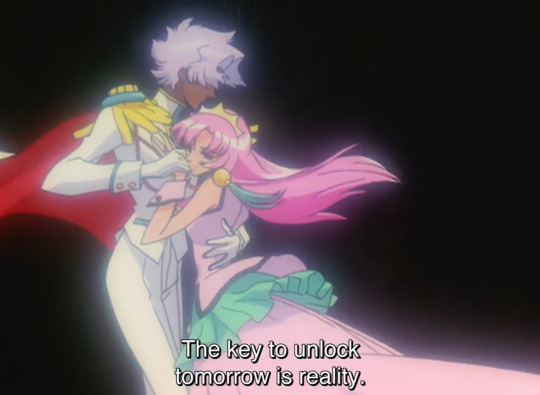
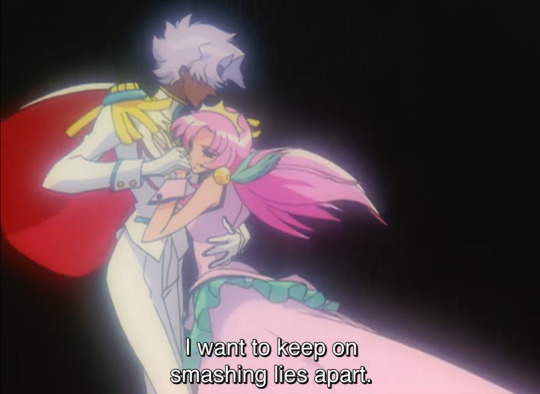
I hope this essay helped provide more context for the series. thanks for reading!
#rgu#commentary#revolutionary girl utena#this was originally a part of another essay but i revamped it and added a lot more detail
878 notes
·
View notes
Text
On American soldiers serving during WWII:
“Sensitive” men often found one another while working on the extraordinarily popular “soldier shows” for which the USO provided the know-how and the materials. These shows were written, directed, and performed by men in the armed forces. Since there were no women in outlying camps, enlisted men would perform female roles in drag. Performances ranged from comic portrayals of burly men in dresses to realistic female impersonation. For actors and audiences, these performances were a needed relief from the stress of war. For men who identified as homosexual, these shows were a place where they could, in coded terms, express their sexual desires, be visible, and build a community. These lyrics for a “female” trio in a soldier show demonstrate how homosexual enlistees introduced their own humor into skits: Here you see three lovely "girls" With their plastic shapes and curls. Isn't it campy? Isn't it campy? We've got glamor and that's no lie; Can't you tell when we swish by? Isn't it campy? Isn't it campy?16 Later in the war, when WACs were available to perform with men, their involvement was limited; usually they worked backstage to help the men be made up as women. An indication of the popularity of female impersonation in soldier shows is evident in Irving Berlin’s This Is the Army. Written for an all-soldier cast, it premiered on Broadway in 1942 and a year later became a hit Hollywood film with Ronald Reagan. Both the Broadway and film versions featured soldiers dressed as women.
--A Queer History of the United States (2011), Michael Bronski; Chapter Eight: Sex in the Trenches
Fascists rely on a sanitized homogenized understanding of a hazily golden national history to hawk their wares to their recruits and dehumanize their enemies. Moral panics, too, rely on inaccurate popular understandings of history to promote attacks on their victims. Like every other human endeavor, these things spread themselves through stories.
WWII looms large in the American memory; we remember it as the last "innocent" conflict on our world stage, inaccurate as that is. (There is no such thing as an innocent player in a world war.) The military preoccupation with fascism and gender looms large, and WWII offers that for far-right ideologues searching for conformity, too: the masculinity of combat, the catharsis of the foxhole, the rigid conformity of the decades that follow. In the memory of such stand-up paragons of masculinity, the fascists will bellow, how can you permit the degenerate decadence of the modern drag queen, the obscenity of a trans woman being so much as permitted to exist? Surely the rejection of that masculinity would have disgusted and upset these fine soldiers, and how could you insult such icons?
But it isn't true. Drag, genderbending, and queerness were entertainments our grandfathers and great-grandfathers sought out, participated in, and shared with one another. Some of the queer ones fucked about it, and so did some of the straight ones, but not everyone. Some of the soldiers were playing, and some weren't. Either way, "female impersonation" was a staple of entertainment, both in the form of soldier-entertainers and for audiences back home. It continues to be a form of popular mainstream entertainment today, of course: only consider Mrs Doubtfire and Monty Python and RuPaul's Drag Race and Blackadder and MASH and Tyler Perry's Madea and Hairspray, to name only a few of many.
There's more than one way to knock down an image and an idol cherished by bigots, my friends. Don't forget that the stories the lazy fascists tell about how it was long ago and far away aren't the only stories left to tell. It turns out that the past wasn't any less full of degenerates and queers than the present is--or than the future will be.
270 notes
·
View notes
Text

Harbour House, Home of the Potomac Maritime Society
Commissioned in 1892 by James Wellington Thorndike, a prominent shipping merchant who made his fortune establishing trade routes between Baltimore and Asia. Having immigrated from Bristol, England in his youth, Thorndike sought to create a sanctuary that merged American innovation with European maritime tradition.
The original structure was designed by renowned architect Stanford White, who drew inspiration from both Newport's Gilded Age mansions and traditional English maritime clubs. The distinctive three-story building, with its commanding views of the Chesapeake, featured a signature octagonal watchtower that still serves as a landmark for vessels today.
During the Prohibition era (1920-1933), Harbour House gained notoriety as a gathering place for Washington's elite, who would arrive by boat for "afternoon tea" - though rumors persisted about hidden wine cellars and secret passages used for rum-running. The club's guest books from this period, still preserved in the library, bear signatures of several senators and at least two Supreme Court justices.
The property survived a devastating fire in 1943, which destroyed the east wing but spared the historic main hall with its hand-carved mahogany bar and original brass telescopes. The reconstruction effort, led by Thorndike's grandson William, added the now-famous verandas and modernized the facilities while maintaining the building's historic character. In 1962, Harbour House made history by becoming one of the first yacht clubs in the region to admit women as full members. This progressive decision was influenced by Katherine "Kay" Thorndike, William's daughter, who had become an accomplished sailor in her own right.
Notable moments in Harbour House's history include:
Hosting several planning meetings for the D-Day invasion during WWII, when the club served as an unofficial gathering point for Allied naval officers.
The visit of Sir Thomas Lipton in 1925 during his America's Cup campaign.
Serving as the emergency coordination center during the historic Chesapeake flooding of 1933.
The establishment of one of the first youth sailing programs in the region in 1958.
Today, Harbour House stands as a testament to the region's maritime heritage, with many original elements preserved, including:
The original lighthouse-inspired watchtower.
The Thorndike family's private collection of maritime maps and navigational instruments.
The "Captain's Room" with its 19th-century ship models and original furnishings.
#sims build#ts4 build#sims interior#ts4 interior#the sims#sims#show us your builds#ts4#simblr#sims community#the sims community#the sims 4#brindleton bay#ts4 maxis mix#maxis mix#sims builds#pixelplayground lots#*Harbour House
251 notes
·
View notes
Text

Betty White was a 20 year-old budding model and actress whose career was just taking off when she put it all on hold to join the American Women's Voluntary Services as a truck driver, where she transported supplies to various Army barracks across California. Often working 16 hour days, she drove trucks for the duration of the war before resuming her acting career. "It's the least I could do to support those precious boys overseas" she said of her time as an Army truck driver during WWII.
#betty white#us army#army women's voluntary services#1940s#ww ii#wwii#hollywood#old hollywood#20th century#40s#war effort#celebrities who served
557 notes
·
View notes
Text
Okay y’all, I don’t really get political on here as much as some other people—I have done political stuff in the past, but not a lot. But something needs to be said.
And yes, I will be the one to say it, because if a Jewish person says it, some people are just gonna say that they’re colonizers, this, that, and the other. But we need reason, and not just blindly accuse each other of deplorable acts.
There’s been a lot of heat on both sides of the Israel-Palestine issue, and for good reason. But I’m going to offer my own perspective. I know I’m going to get a lot of hate, but I’m not going to stand here and just blindly accept the marginalization of human lives.
I’m from the USA, as some of y’all know, and my country has sadly done a lot of hurt towards many different people of many different backgrounds, and we’re still dealing with the repercussions of that today. So keep this in mind, because I want to ask you all some questions.
Native Americans were subject to horrible treatment by white settlers, including being put on reservations, having their land taken, and having their culture erased. Would this give them the right to storm the US Capitol, rape women, take mothers and children as hostages, and kill civilians?
African-Americans, also, were subject to horrible treatment, including the slave trade, segregation, and outright murder based on nothing but the color of their skin. Would this give them the right to storm the US Capitol, rape women, take mothers and children as hostages, and kill civilians?
For a more recent example, Japanese people were put in internment camps during WWII. Many of these people had never set foot on Japanese soil, but had been born and raised as American citizens. Would this give them the right to storm the US Capitol, rape women, take mothers and children as hostages, and kill civilians?
If the answer to these three scenarios is no, why is it okay when Hamas does it to Israeli citizens?
I’m not going to address the issue of land ownership, since that isn’t getting anyone anywhere with this argument. But what I will say is this: the day that Hamas chose to start this whole thing shows you all you need to know about their true colors.
What day was that? October 7th, 2023. Right at the beginning of Simchat Torah, one of the holiest days in Judaism.
Hamas literally chose one of the holiest days in the Jewish faith to start the killing, torturing, and suffering of Jews that continues today, more than a year after it started. This is no arbitrary date, and many other terrorist groups have a similar modus operandi—take the 2019 Sri Lanka Easter bombings, for example.
Hamas aren’t freedom fighters, or a resistance movement. They are terrorists who will not stop killing until every Jew both in Israel and outside Israel is dead.
And they don’t just kill Jews. They’ve even killed other Palestinians—take the conflict in July and August of 2014 when 23 Palestinians were murdered by Hamas, many of whom were supporters of Rafah, Hamas’s political rivals.
When I say this, I am not trying to dunk on Palestinians. Many Palestinians have nothing to do with this, and just want the fighting to stop. But there are other Palestinians, and many Palestinian supporters, who have done absolutely reprehensible things—attacking Jews publicly, tearing missing posters of Jews down, and calling for the death of Jews, to name a few.
I fully understand that many Palestinians do have grievances against the Israeli state. That is perfectly valid, and I will always fight as an American for free speech everywhere, and for the right for the people to speak out against oppression. But these actions that are being taken are not the answer, and they’re only going to lead to more antisemitism and Islamophobia, both of which we have enough of in society without all this.
In summary, to the Jews: keep fighting. You matter, you are loved, and you are necessary in this world. All is not lost yet.
To the Palestinians: You have a right to your beliefs, and to your opinions, including about the Jewish state. I will always fight for your right to speak your minds, and to speak out against oppression and discrimination. But all it takes for evil to triumph is for good men to do nothing. Speak out against oppression of your neighbors, and speak out against terrorism.
History has its eyes on both of you. For your sakes, and for the sakes of those after you, choose wisely.
229 notes
·
View notes
Text
I’ve been thinking about Irving a lot during this episode, funnily enough, and not even just in an “I miss my guy” way. I think the fact that him and Harmony are the two oldest members of the “main” cast definitely links them in some way in my mind, even with the 10 year age difference. I think the historical periods and socioeconomic circumstances that Irving and Harmony grew up in have a quality of structural desperation that contrasts with the personal desperation of the younger members of the cast, although assuming the reality of certain parts of US history remain in the Severance timeline, I would say that Milchick being born during the time period where the first generation of Black americans was entering the mainstream corporate and political sphere would be significant on the point I want to make.
Irving would have been born right at the start of the Vietnam War, with a father in the navy right out of WWII, with Eisenhower interventionism off the charts, and the disaffect towards US internal and foreign policy would only increase in his youth, and it would go on for long enough for him to go to war himself, come back fully disenchanted to the golden years of the Civil Rights Movement and the AIDS crisis, a constant state of precarity between loss, disillusionment, anger and the hope that your fight is going somewhere with constant setbacks.
Despite the 10 years between them, Harmony Cobel grew up in a working class town, already revolving around Lumon, with her mother probably being an employee at the ether mill at that point (which, sidenote: “was she hacking up a lung” in the context of Kier’s courtship of Imogen? Was Jame Eagan pursuing Charlotte Cobel, or Harmony herself? Thinking about the conversation between Harmony and Helena in the parking lot about how she has underestimated her blessings… ). Her mother got sick from the constant chemical exposure and her aunt swooped in to both take care of Harmony (by sending her off to an Eagan boarding school, which did spare her from more child labor at the mill, but also primed her for a career at Lumon) and care for Charlotte, who hated Lumon. The faith was comfort and escape in a life of economic precarity and illness, even if the cause for those things and the venerated figure were the same thing. Loss, disillusionment, anger, leaps of faith once more in the middle of the Nixon administration, with energy shortages, inflation and the slow death of industrial production giving way to the service-based economy that uneducated blue collar workers could not access, much less working class women, but maybe brilliant Harmony with her chip designs could.
Sissy’s house is isolated from the rest of the factory town, a reasonably long drive away. It reminded me of how in Irving’s map the Lenora complex was isolated in an icy nothingness away from the rest of the city center and other Lumon housing complexes, including Burt’s. It makes me think of how, in the severed floor, the distance between departments might be physically not that big, but the dizzying labyrinthic hallways make the isolation even more anxiety-inducing, more inescapable. And also how Irving was familiar with the way to Perpetuity without a map at the ready, knew how to locate the conference room, got back from Wellness with relative efficiency learned the way to O&D through Burt’s map in a cinch because he wanted to get rid of the crushing isolation. Sissy and Irving are old, they live alone, they are principled and disciplined, and their access to care and support is incredibly conditional, the highest honor is isolation.
The scene at the shed at Sissy’s also reminded me a lot of Irving going through his outie’s storage room during the OTC (and Drummond doing the same while outie Irving’s at dinner with Burt and Fields.) Harmony flipping through the annuary with her classmates and Jame Eagan, like the picture of Irving’s dad next to the list of Lumon employees. Who was with Lumon while I was there, in the Severed floor/at Myrtle Eagan school for girls?
Harmony has been described as a soldier by Reghabi, as someone who grew up surrounded by the company’s values, that will be loyal to those values no matter how much she pretends she isn’t. But she picks up Devon’s call, she encourages Mark to quit, she wants to learn what went wrong with Petey, she tears down her altar and spits in Sissy’s face that she doesn’t owe Lumon anything, that they took her ideas and twisted them, got the credit, got the money, and hurt people with them. I think about how Irving was definitely in the military, and it was probably because he grew up in a military household where his father set the tone, and it definitely shows in his innie, in the way his outie carries reminders (the medals, the sriracha sauce, ace of spades), but also how how every time we’ve seen him it’s not a soldier we see - he’s reading, he’s painting, he’s collecting information about people who’ve spoken out about Lumon’s cruelty, he’s calling people to update them on his innie’s status, he’s attending dinner at a stranger’s house and remaining relentlessly kind when confronted with a soul-charring amount of internalized homophobia from the people that invited him in the first place.
They were raised to be soldiers in decades where that was sold as the only way to survive the state of the world, and it took them time and it was certainly not without consequence for them and for others, but I believe they’re trying to be something else. And I think that’s wonderful and rare.
#i'm keeping my milchick parallels for the MDR four-way mirror essay and this is technically sweet vitriol meta#so that's why i'm only namedropping. But. know that he is on my mind during the whole post#severance#making#severance meta
172 notes
·
View notes
Text
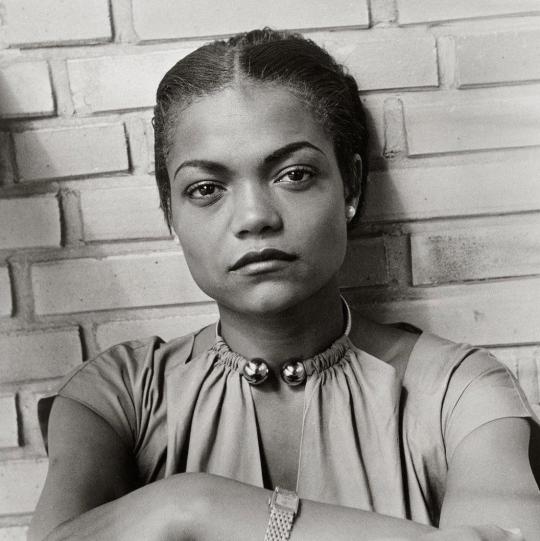
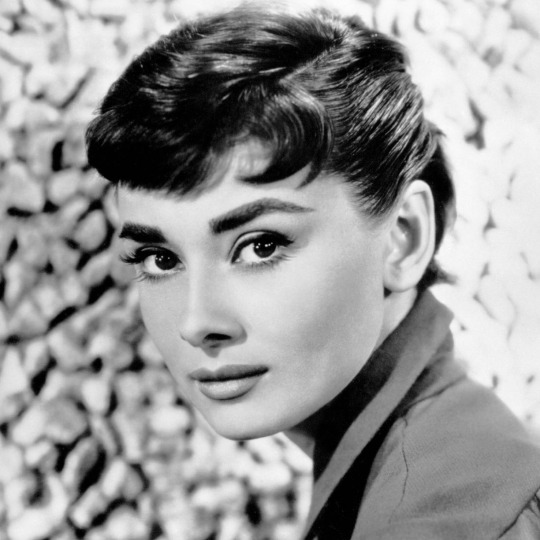
Propaganda
Eartha Kitt (Anna Lucasta, St. Louis Blues)—My friend and I have a saying: NOBODY is Eartha Kitt. A thousand have tried, and they've all come up empty and will continue to do so. Everyone knows her for something: from "Santa Baby" to Yzma in Emperor's New Groove to Catwoman to making Lady Bird Johnson cry for the Vietnam War. She was a master of comedy and sex, an extremely vocal activist, and she aged like fine wine... I honestly don't know what I can say about her that hasn't already been said, so I'll stick to linking all my propaganda. Like what else do you want from me. She was iconic at everything she ever did. Literally name another. How can anyone even think of her and not want to absolutely drown?
Audrey Hepburn (My Fair Lady, Sabrina, Roman Holiday)—I know people nowadays are probably sick of seeing her with all the beauty and fashion merch around that depicts her and/or Marilyn Monroe but she is considered a classic Hollywood beauty for a reason. Ironically in her day she was more of the alternative beauty when compared to many of her contemporaries. She always came off with such elegance and grace, and she was so charming. Apparently she was a delight to work with considering how many of her co-stars had wonderful things to say about her. Outside of her beauty and acting ability she was immensely kind. She helped raise funds for the Dutch resistance during WWII by putting on underground dance performances as well as volunteering at hospitals and other small things to help the resistance. During her Hollywood career and later years she worked with UNICEF a lot. Just an all around beautiful person both inside and out.
We are in the quarterfinals of the Hot & Vintage Movie Women Tournament. All other polls in this bracket can be found here. Propaganda is not my own and is on a submission basis. Please reblog with further support of your beloved hot sexy vintage woman.
[additional propaganda submitted under the cut.]
Eartha Kitt:
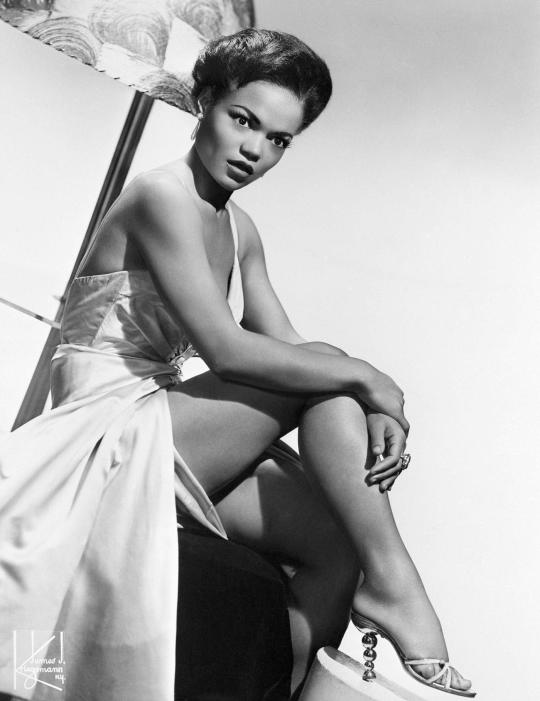
"A hot vintage woman who was not just known for her voice, beauty, poise, and presence, but also her unapologetic ways of speaking about how she was mistreated in the show business as a girl who grew up on cotton fields in South Carolina in the 1930s through the 1940s coming to Broadway first and then Hollywood."
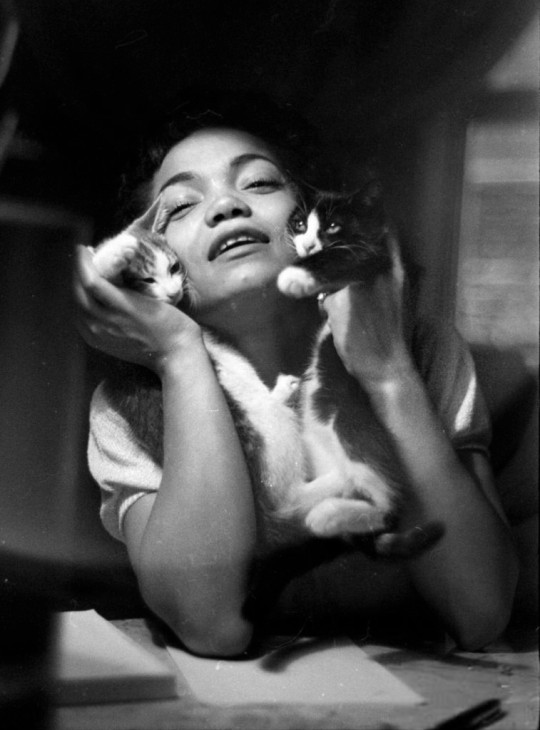
"Have you watched her sing?? Have you seen her face?? Have you heard her talk?? How could you not fall instantly in love. She makes me incoherent with how hot she is."
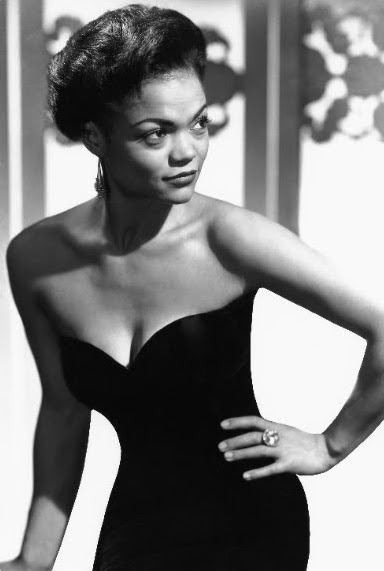
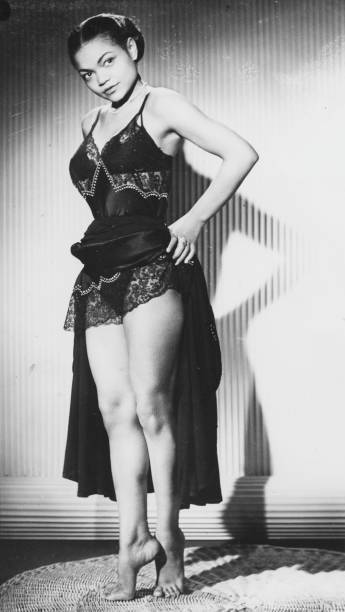
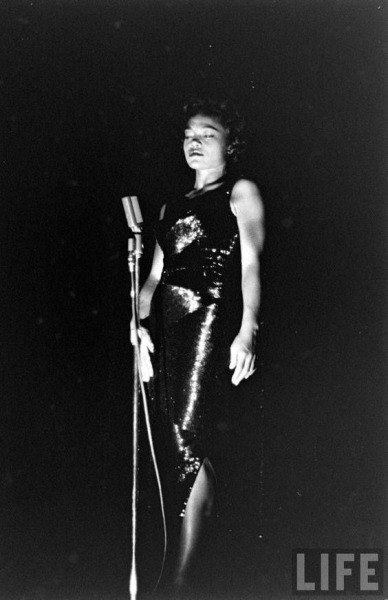
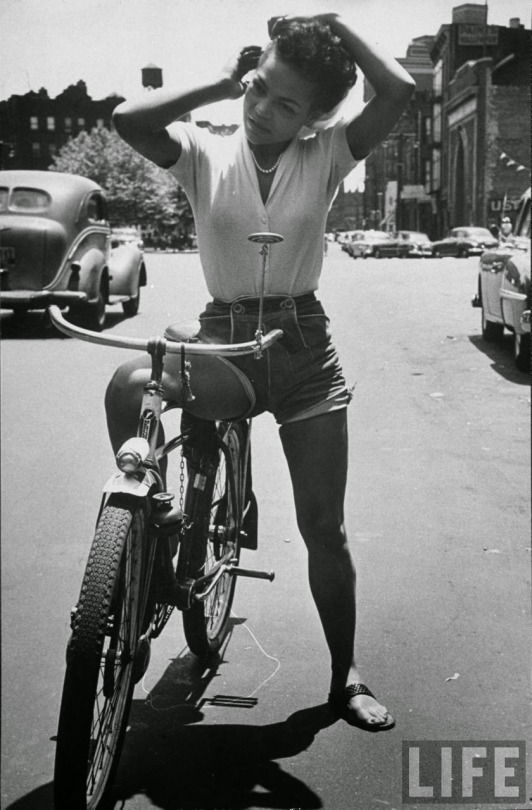
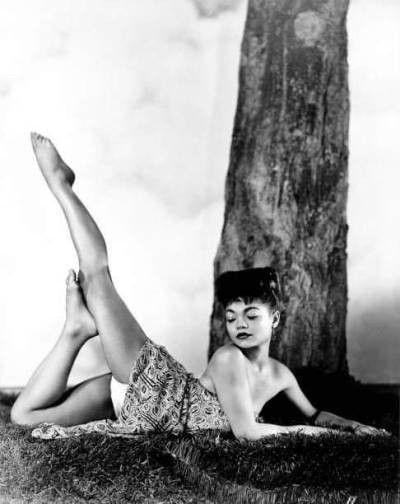
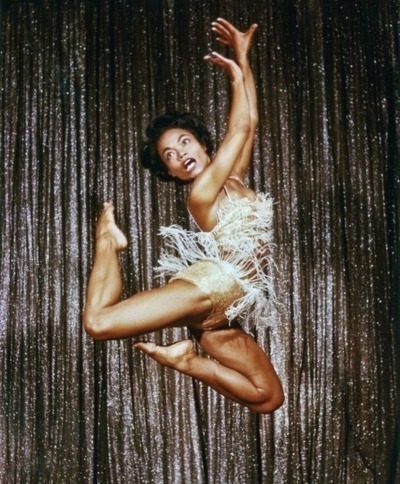
"She can ACT she can SING she can speak FOUR LANGUAGES she is a GODDESS!!! Although she is (rightfully) remembered for her singing, TV appearances (Catwoman my beloved), and later film roles, her early appearances in film are no less impressive or noteworthy!! She’s an amazing actress with so much charisma in every role. She was also blacklisted from Hollywood for 10 years for criticizing the Johnson administration/Vietnam War, so. Iconic. Also Orson Welles apparently called her “the most exciting woman in the world.”
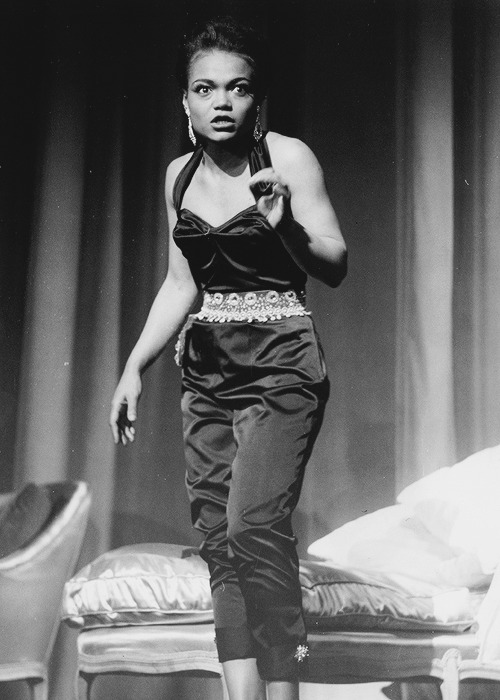
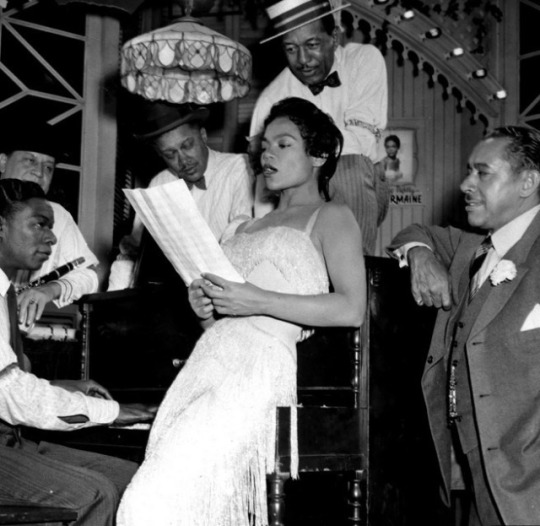
"She had such a stunning, remarkable appearance, like she could tear you to shreds with just a glance- but the most undeniable part of her hotness was her voice, and it makes sense that it's what most people nowadays know her for. Nothing encapsulates the sheer magnetism of her singing better than this clip of her and Nat King Cole in St. Louis Blues, she pops in at 2:49. Also I know it's post-1970 but her song that was cut from Emperor's New Groove is likely to make you feel Feelings."
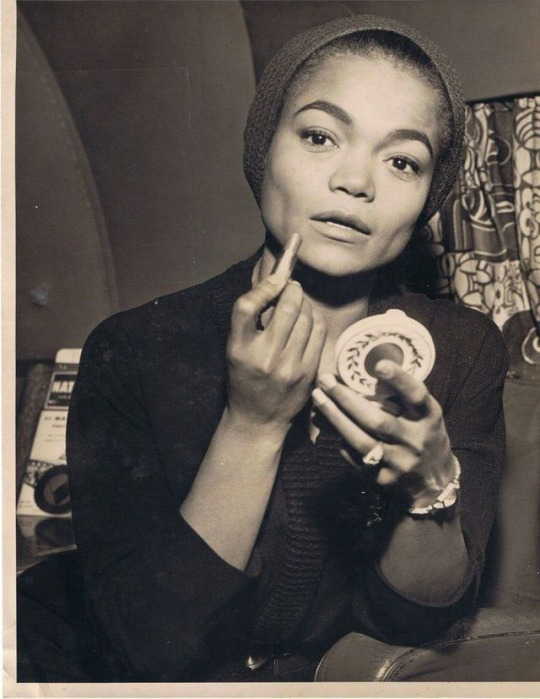
"Even with as racist as Hollywood was in the 1950s and 60s, Eartha Kitt STILL managed to have a thriving career. She also once had a threesome with Paul Newman and James Dean, and called out LBJ over the Vietnam War so hard that it made First Lady Johnson cry. Eartha Kitt was talented, sexy, and a total badass activist."
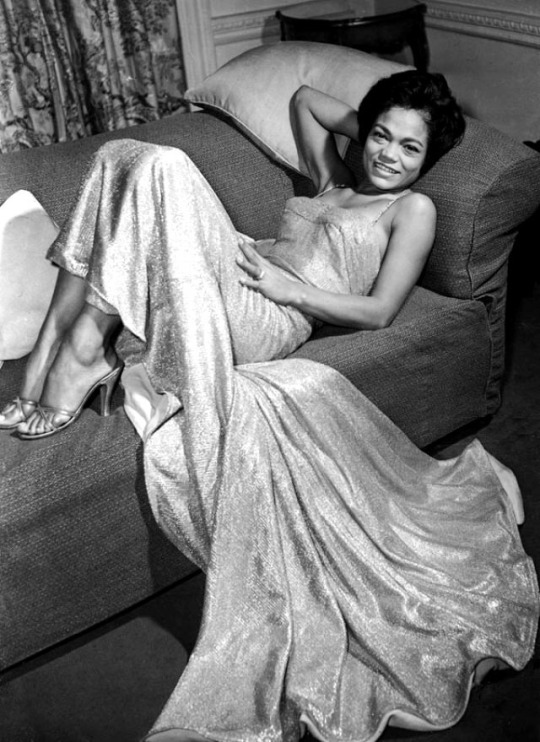
Audrey Hepburn:
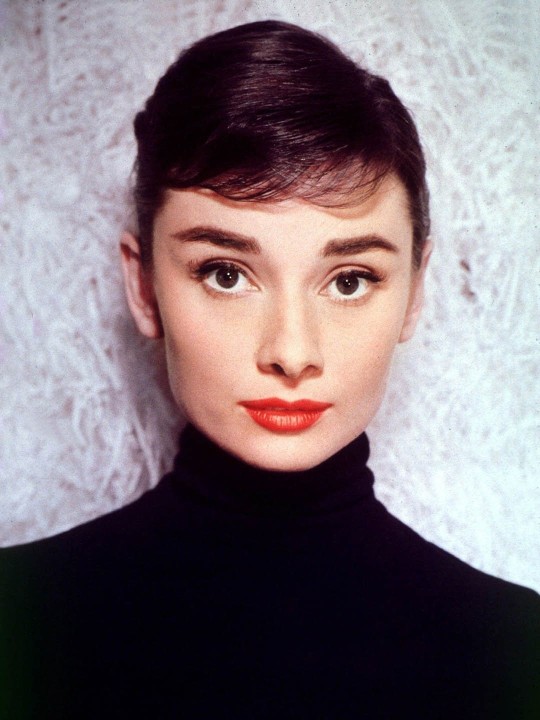
"She may be a wispy, thin little thing, but when you see that girl, you know you're really in the presence of something. In that league there's only ever been Garbo, and the other Hepburn, and maybe Bergman. It's a rare quality, but boy, do you know when you've found it." - Billy Wilder
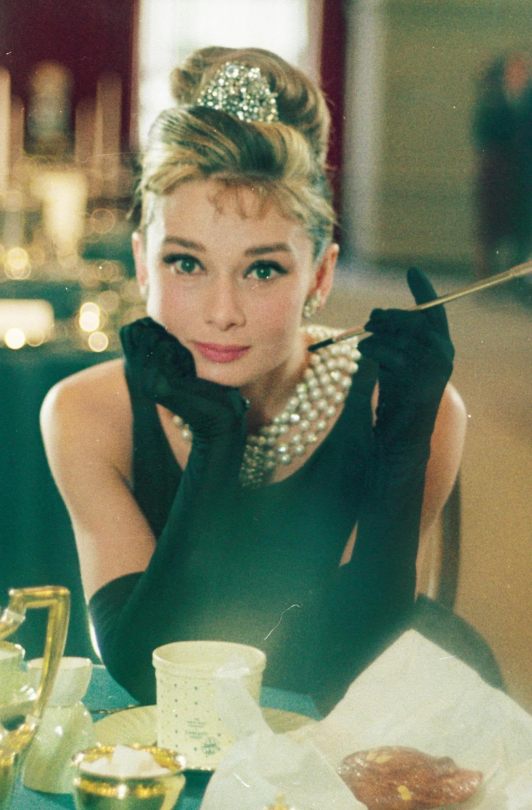
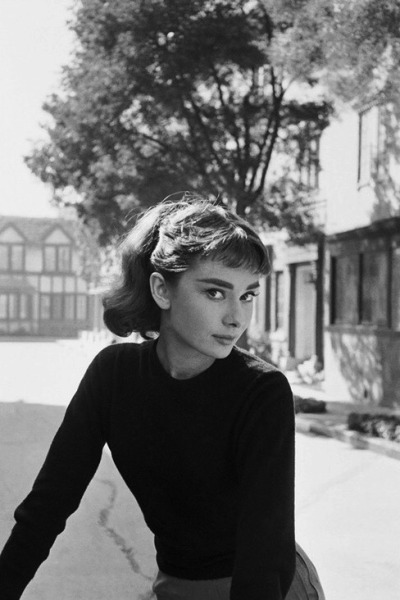
Raised money for the resistance in nazi occupied Hungary. Became a humanitarian after retiring. Two very sexy things to do! [editor's note: not Hungary; Audrey was involved with the Dutch resistance. Source.]
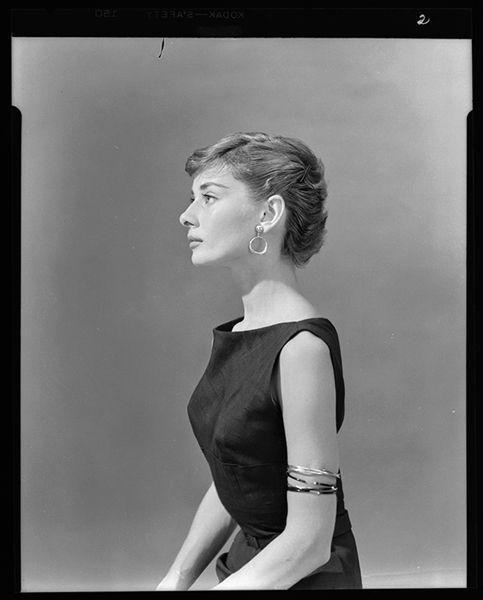
"It’s as if she dropped out of the sky into the ’50s, half wood-nymph, half princess, and then disappeared in her golden coach, wearing her glass slippers and leaving no footprints." - Molly Haskell
"All I want for Christmas is to make another movie with Audrey Hepburn." - Cary Grant
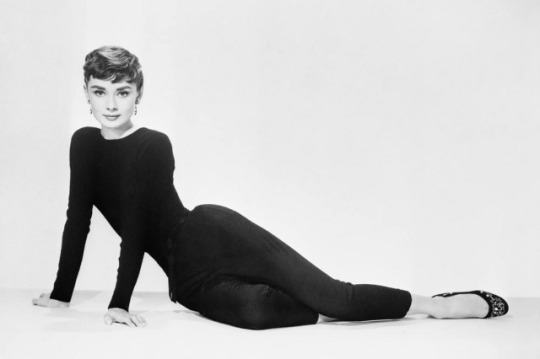
where to begin......... i wont her so bad. i literally dont know what to say.
My dude. The big doe eyes, the cheekbones, the voice. The flawless way she carried herself. She was never in a movie where she wasn't drop dead gorgeous. Oh, also the fact she raised funds against the Nazis doing BALLET and she won the Presidential Medal of Freedom for her humanitarian work.
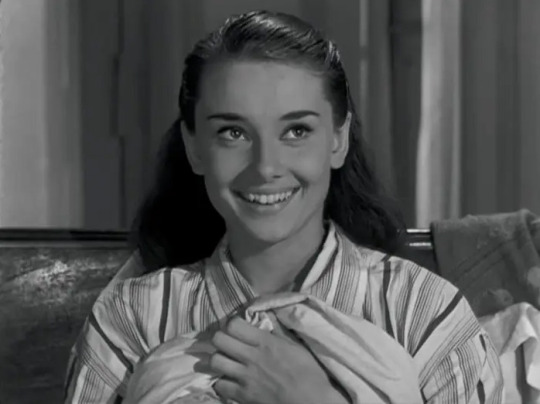
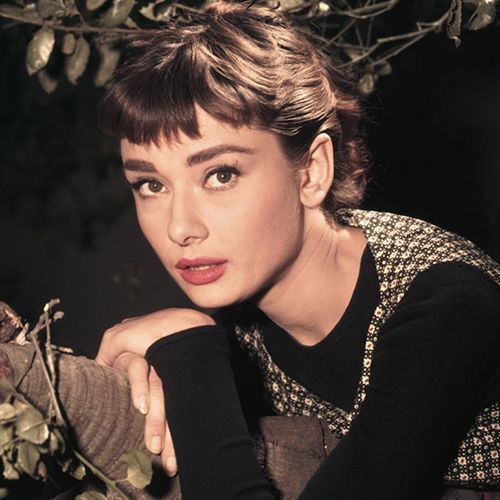
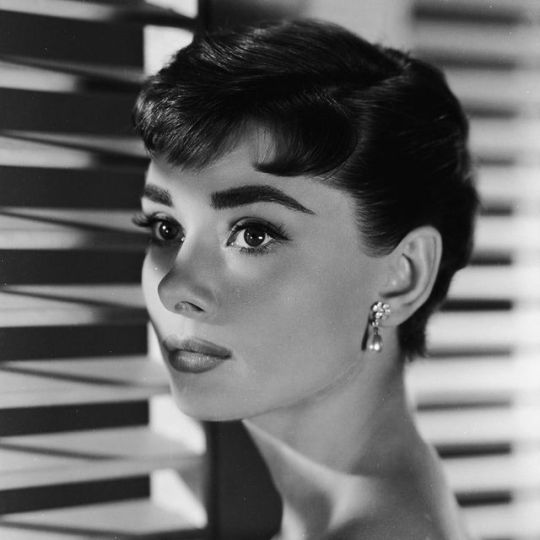
Growing up, Audrey Hepburn desperately wanting to be a professional ballerina, but she was starved during WWII and couldn't pursue her dream due to the effects of malnourishment. After she was cast in Roman Holiday, she skyrocketed to fame, and appeared in classics like My Fair Lady and Breakfast at Tiffany's. She's gorgeous, and mixes humor and class in all of her performances. After the majority of her acting career came to close, she became a UNICEF ambassador.
youtube
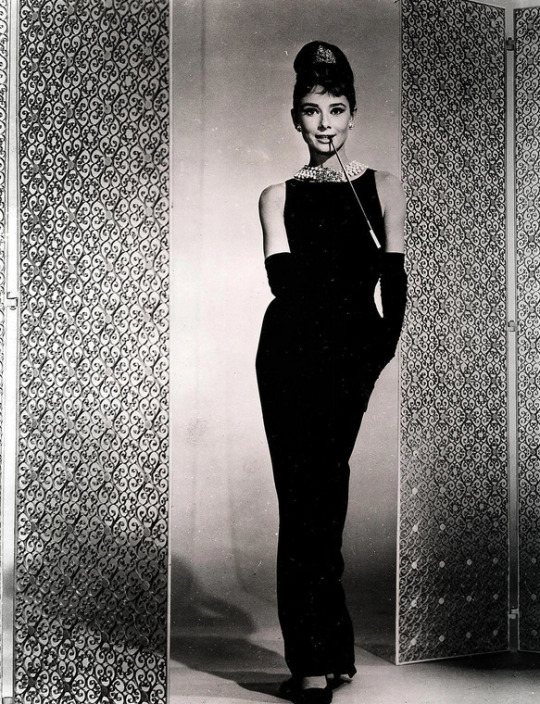
No one could wear clothes in this era like she could. She was every major designer's favorite star and as such her films are time capsules of high fashion at the time. But beyond that, she had such an elegance in her screen presence that belied a broad range of ability. From a naive princess, to a confused widow, to a loving and mischievous daughter, she could play it all.
Look at that woman's neck. Don't you want to bite it?
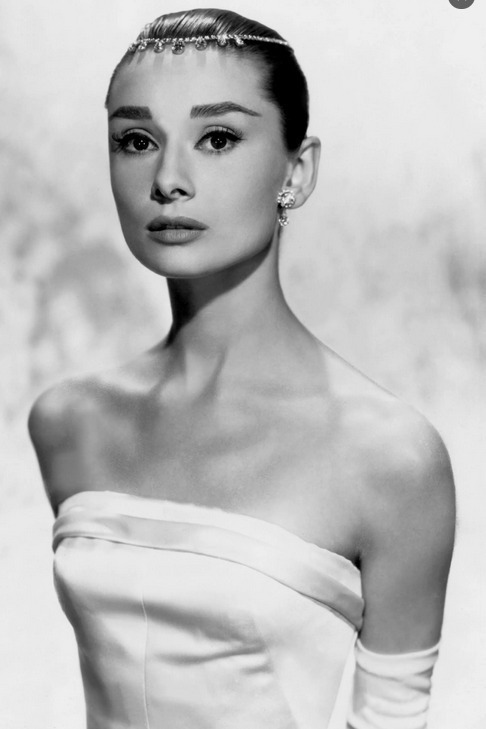
558 notes
·
View notes
Text
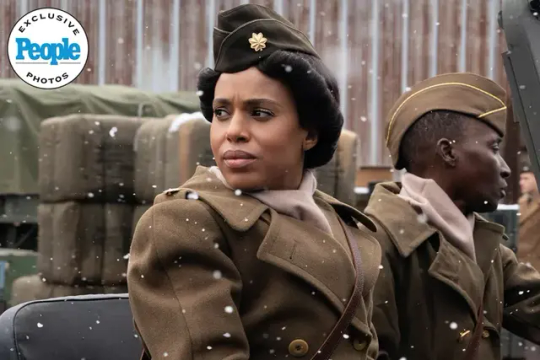
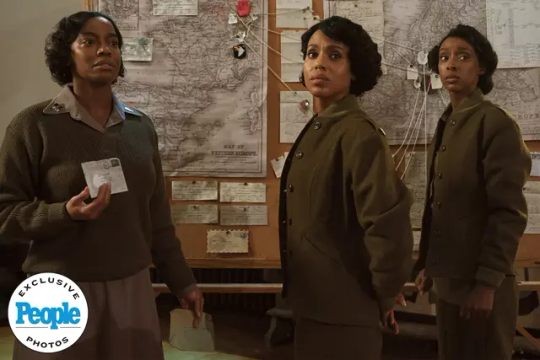
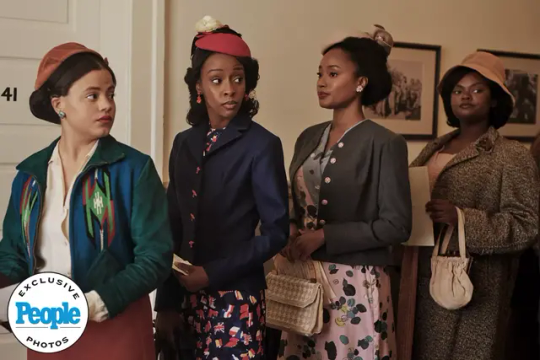

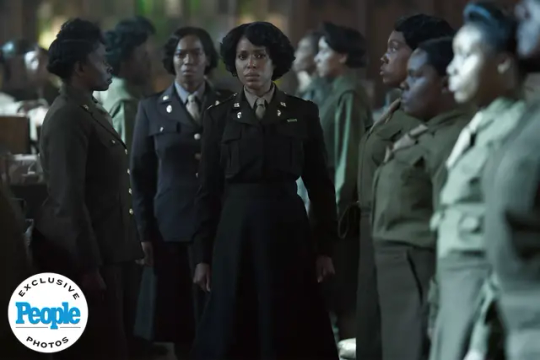
https://people.com/tyler-perry-the-six-triple-eight-first-look-exclusive-8701722
We finally have a trailer and a release date for the Six Triple Eight movie!! December 20, 2024 on Netflix!!
I'm so so excited for this movie! And everything I see looks so good. The hair styles, the civilian outfits, the uniforms are worn correctly and with the right insignia and hats. The clips in the trailer look so good and accurate and I'm so excited!!!
It's about time we had a WWII film focused on women. Where the women are not background characters. Where the focus is not a love story. Where the women are not props for the men's stories. Finally we have a movie about what women did during World War II that isn't about the home front or nursing! Cause they did SO MUCH during the war and it's never told.
The story of the 6888th Battalion is incredible and I'm beyond thrilled to see it told this way. Me and my fellow female WWII reenactors are going to have a watch party.
#wwii#world war ii#history#six triple eight#6888th central postal battalion#wac#womens army corps#women in wwii#mod post#i legit started crying watching the trailer
267 notes
·
View notes